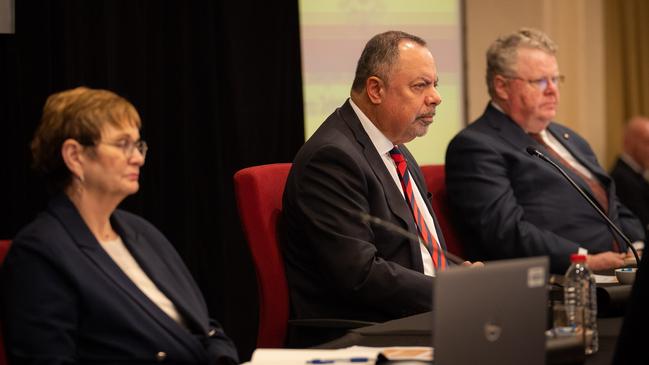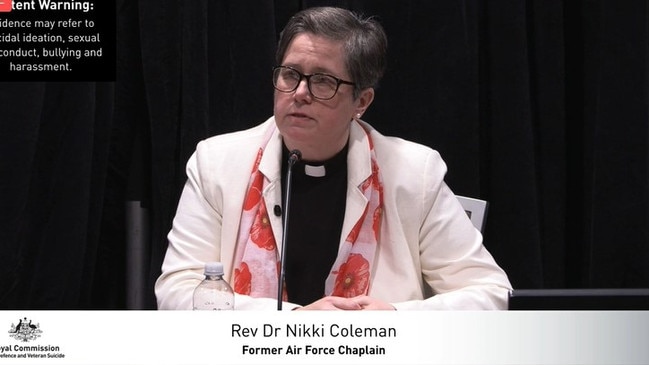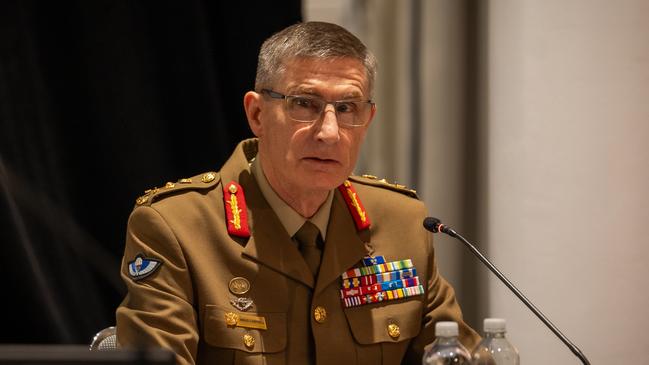Royal Commission Into Defence and Veteran Suicides comes to an end as commissioner blasts ‘failures’
The commissioner heading the Royal Commission into Australia’s military suicide crisis has delivered a scathing conclusion, warning of a ‘catastrophic failure’ in leadership.
A “catastrophic failure” in senior government and Defence leadership has led to a “senseless loss of life” in Australia’s military community, the man leading the Royal Commission into Australia’s military suicide crisis has said in scathing remarks delivered at the close of the three-year inquiry.
Deaths by suicide have taken the lives of at least 1677 servicemen and women between 1997 and 2021 – 20 times the number of service personnel killed on active duty.
The Royal Commission Into Defence and Veteran Suicide, led by Commissioner Nick Kaldas alongside Dr Peggy Brown and James Douglas KC, has held multiple hearings around the country and received some 230,000 documents, 5889 submissions and heard from 344 witnesses – from the chiefs of each military branch to enlisted soldiers, sailors and air force members.
Mr Kaldas, delivering his closing remarks on Thursday afternoon, said the “true toll” of preventable deaths was upwards of 3000 and blasted what he saw as pervasive and systemic failures in senior leadership to address the crisis.
“It’s apparent there has been a catastrophic failure of leadership at a government level and within the military to prioritise the urgent reforms and implement effectively the previous recommendations required to deliver improved health and wellbeing outcomes for defence personnel and veterans,” he said.

“And despite all the rhetoric from those in positions of power about people being Defence’s greatest asset – the senseless loss of life, and the devastating impacts for families and loved ones, continues to this day.”
The commission heard harrowing testimony from former service members who suffered dramatic mistreatment as they grappled with mental health challenges during their service, including former navy diver John Armfield, who suffered alleged mistreatment in the military in the past three years while the commission itself was active.
Mr Armfield lost his brother, RAAF Leading Aircraftman Andrew Armfield, to suicide in October 2011, but Mr Armfield only found out about the existence of an internal report into Andrew’s death 10 years after the traumatic event.
When the report was made available to him, he told the commission how he drove to the post office to pick it up without any support in place to help him process the findings, which he said revealed serious failures in his brother’s care.
“I was sitting in my car, broken,” Mr Armfield said.
“I’d loyally served my nation and this is how they’d given me the report on my little brother’s death.”
Mr Armfield, an Afghanistan veteran and military recruiter, alleged serious failures in the ADF’s treatment of his brother and also spoke about a hostile culture as he grappled with the circumstances of Andrew’s death.
The commission also heard evidence from Colonel Paul Morgan about an unacceptable behaviour complaint he lodged while serving in the Army.
“Colonel Morgan’s complaint involved details of a Facebook hate group designed to intimidate gay members of the Defence Force,” Mr Kaldas said. “He also received death threats and had threatening letters delivered to his home.”

In Colonel Morgan’s account, his superiors did not conduct a quick assessment of the complaint, despite their legal obligations to do so.
Former air force chaplain Dr Nikki Coleman was allegedly abused while serving and she revealed details of a toxic workplace culture that she said pushed her to the brink of suicide.
Mr Kaldas said the ADF needed to undertake substantial cultural change to reduce the prevalence of misconduct and its link to elevated suicide risks.
“The final report of this Royal Commission – due to be handed down in September – will be a blueprint for the long-overdue cultural and system-wide reforms required to deliver improved health and wellbeing outcomes for our serving and ex-serving ADF members, and their families,” he said.
One cultural value he said needed to change was the stigma surrounding mental health issues, which he said prevented members from seeking help for fear of being seen as “weak”.
Australian Defence Force chief General Angus Campbell, the final witness before the commission, agreed with Mr Kaldas’ emphasis on stigma and said a widespread fear of stigma around mental health was a key factor stopping service personnel from accessing health care.
A mental health issue can affect a service member’s medical employment classification status, which can have an impact on deployments and opportunities within the military.
The General said it was “very difficult” change the cultural mindset in the Defence community that might lead to more open reporting of mental health problems.
“This is a constant conversation and one in which things like mental health awareness days and ‘Are You OK’, the mandatory training sessions that are held, the encouragement at a whole lot of levels but particularly at the local, tactical team level of encouraging and speaking about issues and that mindset that seeking help may see you not participate in tomorrow or the next activity but will enable you to partner in many activities beyond,” he said on Thursday.

General Campbell said driving the “right” culture into every layer of the 100,000 personnel-strong Defence enterprise was critical to making improvements alongside pushing the mammoth bureaucracy away from a “disaggregated”, or splintered organisation, into a more unitary enterprise with a common set of policy settings and values.
In his final remarks, General Campbell vowed to push for enduring reform in Australia’s military and defence culture.
“My comment to everybody would be to know and do what is right and when you see that is not what is happening, just stand up and you will be supported.”
Mr Kaldas, however, expressed caution about the ability of Defence leadership to propel reform.
“Serious questions do remain about the urgency with which Defence is responding to the deep-rooted cultural and systemic challenges which are contributing to suicide and suicidality,” he said.
“Fixing the cultural and systemic issues we’ve identified will establish the ADF as an ‘employer of choice’ at a time of geopolitical uncertainty when our navy, Army and air force need to be attracting the right people, in the right numbers.
“It will help stop the revolving door of employee turnover that poses a real risk to Australia’s defence capability.”
Originally published as Royal Commission Into Defence and Veteran Suicides comes to an end as commissioner blasts ‘failures’



